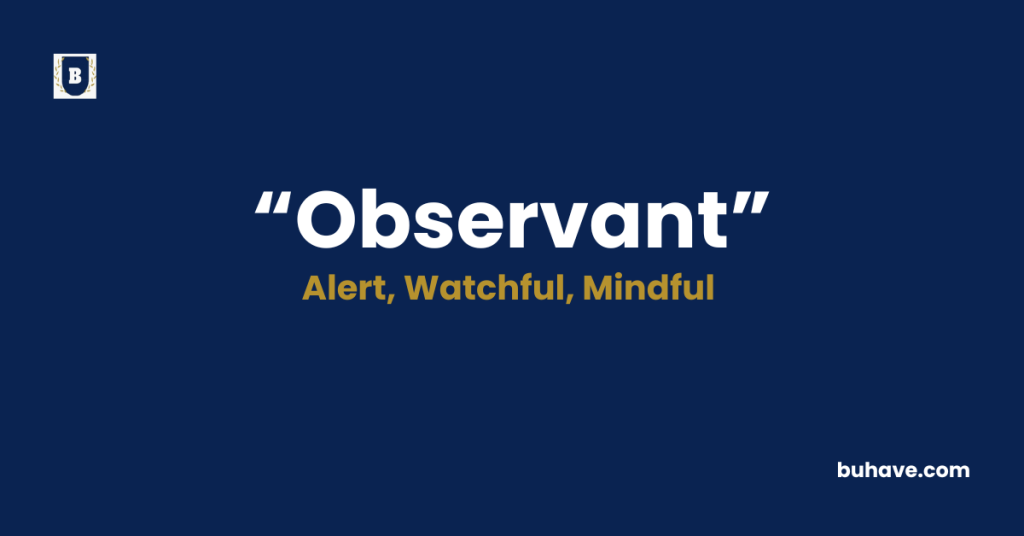The word ‘Observant’ (Adjective) describes someone who pays close attention to details, notices things quickly, and is highly aware of their surroundings. In this guide, you’ll learn the full definition, synonyms, antonyms, etymology, and real-life examples of how to use ‘Observant’ correctly in sentences.
Observant Explained in Depth
A complete and detailed guide to the word Observant including meaning, definition, examples, etymology, synonyms, and antonyms.
Meanings of Observant
The word observant refers to the characteristic of being highly attentive and perceptive. An observant person tends to notice things that others might miss—small details, subtle changes, or behaviors. This quality is often associated with good listening skills, keen eyesight, sharp memory, and critical thinking. In everyday life, being observant helps people understand situations more clearly, react appropriately, and gain deeper insight into people and environments. For example, a teacher who notices a student’s changed behavior can intervene early, or a detective uses their observant nature to spot clues others ignore.
Beyond simple observation, being observant also implies mindfulness and alertness. It reflects a conscious effort to understand, evaluate, and react to surroundings or behaviors. Whether it’s someone recognizing when a friend is upset without them saying a word, or a traveler picking up cultural cues in a foreign country, the quality of being observant adds depth to one’s awareness and decision-making. People who are observant tend to be more thoughtful, insightful, and in tune with their environments, making this trait valuable across personal and professional settings.
Definition
Observant is an adjective that describes someone who is quick to notice or perceive things, especially small details or changes in their surroundings. It can also refer to someone who pays close attention to rules, practices, or traditions, particularly in religious or cultural contexts.
In the most common usage, “observant” conveys mental sharpness and acute awareness. An observant person might notice a small crack in a building’s wall that others ignore, or they might detect a pattern in someone’s speech that reveals more than the words themselves. This ability often involves using all the senses to gather and interpret information. Additionally, the term may carry a secondary meaning: being attentive to moral or ceremonial obligations. For example, someone who is “religiously observant” faithfully follows their spiritual practices. Thus, the word has both a general and a specific usage depending on context, but in all cases, it underscores attentiveness and thoughtfulness.
Etymology
The word “observant” has its roots in Latin and has evolved through French and Middle English into modern English usage. It is deeply tied to the concept of watching carefully and obeying practices. Here’s a closer look at its linguistic origin:
- Latin: The word derives from “observantem,” the accusative form of “observans,” the present participle of “observare,” which means “to watch, heed, regard, or comply with.” This Latin root emphasizes both paying attention and adhering to norms or customs.
- Old French: From Latin, it passed into Old French as “observant,” where it retained the dual meaning of being attentive and conforming to religious or social obligations.
- Middle English: It entered the English language in the late 14th century as “observant,” preserving the same general meanings—being watchful and devoutly adherent to rules or ceremonies.
Over time, “observant” solidified its usage in English as a description for anyone highly aware or deeply attentive. It retained its religious undertone in phrases like “observant Jew” or “observant Muslim,” indicating someone who closely follows religious laws or customs. Meanwhile, in secular contexts, it increasingly came to describe someone who notices fine details or recognizes subtle signals. This rich etymological history contributes to the word’s nuanced meaning today combining attentiveness, awareness, and careful adherence to important matters.
Example Sentences
- She’s very observant and always notices when something is out of place.
- The detective’s observant nature helped him solve the case quickly.
- Children can be surprisingly observant and often notice things adults overlook.
- As a religiously observant individual, he never misses his daily prayers.
- Her observant eye for fashion trends makes her a successful designer.
Observant Synonyms
- Perceptive
- Alert
- Attentive
- Sharp-eyed
- Mindful
- Vigilant
- Watchful
- Discerning
- Noticing
- Insightful
Observant Antonyms
- Inattentive
- Oblivious
- Unaware
- Neglectful
- Careless
- Unmindful
- Distracted
- Unperceptive
- Blind (figuratively)
- Ignorant
FAQs about Observant
Here are some frequently asked questions (FAQs) about the word “Observant”
1. What does “observant” mean in simple terms?
It means someone who notices things quickly and pays close attention to details around them.
2. Is “observant” always a positive trait?
Yes, generally it is seen as a positive quality because it reflects awareness, intelligence, and attentiveness.
3. Can “observant” be used in a religious context?
Yes, it can describe someone who strictly follows religious laws and practices, such as an observant Christian, Jew, or Muslim.
4. Is being observant the same as being smart?
Not exactly, but being observant often contributes to smarter decisions because it involves noticing and processing useful information.
5. Can children be observant?
Yes, children are often very observant and may notice things adults overlook, especially when they’re curious or interested.
6. Does observant mean judgmental?
No, being observant is about noticing and understanding, not judging. However, it can help in forming thoughtful judgments.
7. What careers value observant people?
Careers in law enforcement, healthcare, teaching, research, design, and counseling all benefit from observant individuals.

















